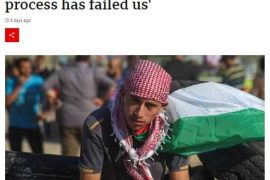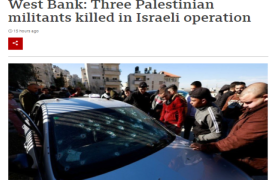This is a cross post from BBC Watch.
1) At the JCPA, Yoni Ben Menachem documents a recent Palestinian Authority story predictably sidelined by the BBC.
“PA Chairman Mahmoud Abbas announced on August 19, 2019, that all of his advisers had completed their work, regardless of their level and titles, and the conditions afforded by their status no longer applied.
This announcement relates to dozens of advisers that Abbas employed in various capacities. The most prominent include Nabil Shaath, adviser on international affairs; Mahmoud Al-Habash, adviser on religious affairs; Gen. Ismail Jaber, adviser on security affairs; Ali Mahana, legislative adviser; and Majdi Al-Haldi, adviser on foreign affairs. […]
Fatah sources are not sure if Abbas fired all of his advisers because his decision did not include a list of all of them and their functions. Mahmoud Abbas remains vague here because some of his associates were defined as his “advisers” so that they could receive a large salary and the perks of the job, such as an office, a car, and so forth.”
2) The ITIC analyses this week’s speech from Hasan Nasrallah.
“On August 25, 2019, Hezbollah Secretary General Hassan Nasrallah gave a belligerent speech claiming Israel was behind the two attacks in Lebanon and Syria: a quadcopter attack on the southern Shi’ite suburbs of Beirut (Israel did not claim responsibility) and the aerial attack on a base southwest of Damascus (Israel did claim responsibility). The attack in Syria disrupted an Iranian Qods Force plan to launch armed quadcopters to attack northern Israel. Nasrallah greatly exaggerated the so-called threat to Lebanon inherent in the use of explosive quadcopters (“suicide quadcopters”) which he claimed set a precedent in the attack on the southern suburb of Beirut. Such a precedent was liable, he claimed, to turn Lebanon into another arena for Israeli attacks (as he claimed Israel had done in Iraq).”
3) Writing at An Nahar, the Assistant Secretary for Terrorist Financing in the U.S Department of the Treasury explains “Why we sanctioned Jammal Trust Bank”.
“Jammal Trust Bank is a primary Hizballah banker in Lebanon, with a long and continuing history of providing an array of financial services to the terror group. Jammal Trust Bank has tried to conceal its relationships with numerous front companies for the U.S.-designated Martyrs Foundation. The malfeasance within Jammal Trust Bank runs to the core. Hizballah’s Member of Parliament, Amin Sherri, who engages in criminal behavior on behalf of Hizballah, openly coordinates Hizballah’s financial activities at the bank with its management. By working with Sherri in this way, the bankers of Jammal Trust Bank have betrayed the trust of their fellow citizens and their banking colleagues. By actively concealing Hizballah’s affiliation with these accounts from the Central Bank of Lebanon, these bankers violated their civic, social, and business responsibilities to innocent account holders, and have risked damage to the international perceptions of the Lebanese banking sector.”
4) At the FDD Jacob Nagel and David Adesnik examine “How the UN’s Nuclear Watchdog Can Restore its Credibility on Iran”.
“After Prime Minister Benjamin Netanyahu announced the Mossad’s discovery of a secret atomic archive in a Tehran warehouse, Amano’s response entailed a blend of procrastination and excuses. Last November, seven months after the Israeli revelations, Amano was still insisting, “We need to analyze the information, and it will take time, of course.” To this day, the IAEA has not stated whether its inspectors have ever visited the Tehran warehouse that stored the archive, or even that the agency requested a visit. Meanwhile, independent experts demonstrated, based on documents from the archive, that Iran’s nuclear weapons program had been far more advanced than the IAEA had ever known.”





